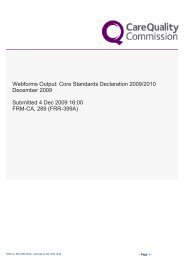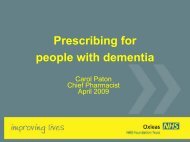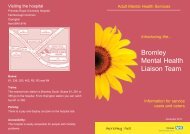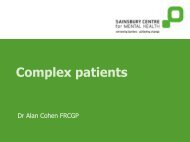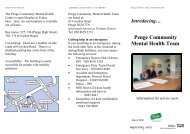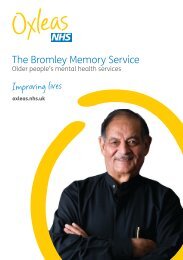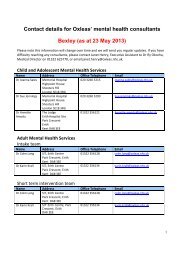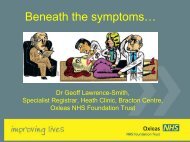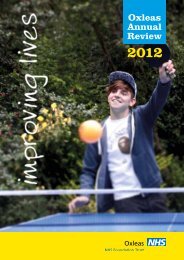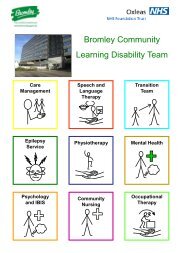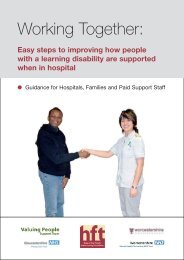4.5 MB - Oxleas NHS Foundation Trust
4.5 MB - Oxleas NHS Foundation Trust
4.5 MB - Oxleas NHS Foundation Trust
- No tags were found...
Create successful ePaper yourself
Turn your PDF publications into a flip-book with our unique Google optimized e-Paper software.
<strong>Oxleas</strong> Review 2009/10
4 ABOUT USQualityABOUT US 5Dr Ify OkochaOne year in themedical hot seatIt’s been a year since Dr Ify Okocha took over the reinsas trust Medical Director. We decided to ask him aboutthe Coalition Government’s plans for the <strong>NHS</strong> andother matters concerning <strong>Oxleas</strong> during his first12 months in post.Under new plans put forward by the Government<strong>NHS</strong> patients have greater choice. Groups of GPs willbe given responsibility for commissioning care for theirlocal communities. As a result of the changes, the <strong>NHS</strong>will be streamlined with fewer layers of bureaucracy.Strategic health authorities (SHAs) and primary caretrusts (PCTs) will be phased out.Management costs will be reduced sothat as much resource as possiblesupports frontline services.The reforms, say theCoalition, will build onchanges started under theprevious Government.Q&A with IfyDr Ify Okocha has an impressive background in the fieldof mental health. He has received commendations andwon many national awards for the high quality careclinical teams working for him deliver. In 2009 he pickedup the Royal College of Psychiatrists Medical Manager/Leader of the Year award at the same time as the trustwas named Mental Health Provider of the Year.How do you see the trust changing nowthat Bexley Community Health Services hasjoined <strong>Oxleas</strong>?Ify: “The trust is moving in an exciting direction.The majority of our work is carried out within thecommunity. This is enhanced by Bexley CommunityHealth Services joining <strong>Oxleas</strong>. A patient withpsychiatric disorders can benefit from work doneby our new colleagues sharing their expertise.A patient’s mental and physical health can beimproved.”What’s happened during the past year that mostcaught your eye?Ify: “The quality agenda has in every sense figuredhugely in everyone’s mind across the organsation inthe past year. Staff now understand what we meanby ‘quality’ - in terms of the effectiveness of the carewe deliver, the patient experience of that care and ofcourse safety.“Also, significantly, the results of the NationalPatient Survey were the best we’ve ever had.”What are your plans for the future of the trust?Ify: “The single most important thing I have to dois make quality a reality for both clinicians andpatients. Because of the financial challenges weall face we have to ensure quality of care is notcompromised.“We may need to think of other ways of deliveringservices and make them more efficient. For instancepatients might find that they have to travel furtherfor care. That does not mean the quality of that carewill suffer.”How do you see the structured changes plannedby the Government for the <strong>NHS</strong> affectingthe trust ie PCTs and SHAs being phased outand GPs having more of a say in how healthcareis provided?Ify: “I can understand where the CoalitionGovernment is coming from in the sense that GPshave first hand experience of individual patientsand the treatment they need.“However, GPs don’t presently have much input intocommissioning of services. They won’t necessarilyhave the overview necessary to make strategicdecisions for all of the local population.“There are concerns about the plans and thetimescales are very short. Presently we work closelywith three PCTs in Bexley, Bromley and Greenwich.We don’t know how many GP consortia we will workwith in future.“But whatever happens the trust needs to be involvedin this process to help shape the future of healthcarelocally. We need to make sure that GPs fullyunderstand what we do.”What does quality mean for mentalhealth services?Ify: “Certainly a way we could improve qualitywould be to improve how we measure outcomes.I can instantly find out how many <strong>Oxleas</strong> patientsare suffering from depression. What I can’t do isquickly find out the outcome of their treatment. Thisis because there is no single measurement tool that isagreed upon by all clinicians treating this condition.This is being addressed by national research which<strong>Oxleas</strong> is taking a lead role in.”... the single most importantthing I have to do is makequality a reality for bothclinicians and patients.
6 ABOUT USFinanceABOUT US 7Money Matters by Richard PageThe role of finance is to facilitate and support the services for patientswe provide, within the constraint of the income we receive. The standardfinancial reports, ratios, targets and ratings do not in themselves show oursuccess or otherwise in this role.Thus, if we made a large surplus the financial statistics would look good;but people would ask are we starving our teams of the resources thatshould be used for delivering services? On the other hand overspending,even if the money is efficiently and effectively spent, would soon turnto chaos, crisis and drastic service cuts.What we try to do is to ensure:- that all expenditure enhances services to our patients- that we spend wisely and efficiently- that we can react to opportunities and problems withoutde-railing our services.Let’s have a look at our finances to see how we managed in 2009/10and what is likely to happen this year and in the future. Taking the formalreporting with its financial ratios and risk ratings, the position was:Income and Expenditure Account2009/10 2008/09£’000 £’000INCOME 138,548 133,675EXPENDITURE (129,135) (123,174)EBITDA * 9,413 10,501PROFIT / LOSS ON DISPOSAL OF ASSETS (11)DEPRECIATION (2,377) (2,214)INTEREST RECEIVED 347 1,433INTEREST PAID (3,128) (4,812)IMPAIRMENT (1,158) (5,236)RETAINED SURPLUS / (DEFICIT) 3,086 (328)The national economyis going through difficulttimes, but <strong>Oxleas</strong> has thefinancial depth to be ableto cope with the changes.Using Monitor (the independent regulator of <strong>NHS</strong>foundation trusts) risk ratings this gives us a ratingof 4.3 (5 is the highest score). So financiallywe are doing well.Looking at our progress and position against themeasures we put on ourselves:• Expenditure to enhance our services- we invested in service quality and this isshown by the improved quality measures- we invested £3m in property- we invested in psychological therapy services.• We spend wisely and efficiently- the costs of our services are the most efficientfor a trust providing similar services.• We are able to react to opportunities andproblems without de-railing our services- resources were invested in the integration workfor Bexley Community Health Services- we were able to absorb significant cost pressures- we financed the work needed to win theKent Prisons contract- there was a major reorganisation inBexley and Bromley- investing in staff development.The Balance Sheet shows that our Income andExpenditure Reserve (I&E) increased to £5.6m, and ourcash reserves to £47m. Although we would like the I&EReserve to be higher, between this and the cash reservewe are in a strong position to be able to weather thefinancial restrictions that the Government plans forthe next few years. We will not be immune from thedifficulties, but with the resources available we will beable to make the changes that will need to be made ina planned and orderly way, with the ability to investin ways that produce long term efficiency andcontinued quality.The trust is also in the position to continue to fundfurther developments and integrations – such as theongoing work that we hope will result in the integrationof Greenwich Community Health Services. These willstrengthen the ability of the trust to provide a widerange of integrated, quality services to the people ofBexley, Greenwich and Bromley.The national economy is going through difficult times,but <strong>Oxleas</strong> has the financial depth to be able to copewith the changes.You can view the full Annual Report and Accountsfor 2009/10 on our website www.oxleas.nhs.uk.Richard PageDirector of Finance* EARNINGS BEFORE INTEREST, TAXATION, DEPRECIATION AND AMORTISATION.
8 ABOUT USSustainabilityABOUT US 9CarbonreductionVoltage optimisationIn the UK there is a national problem of over-voltage,which in layman’s terms means that more energyis supplied than is needed. By installing a singlePersonal computers (PCs)Every PC in the trust will soon have a clever piece ofsoftware installed that will return savings of 15% onthe energy they consume. The ‘Little Foot’ PC powerWe have already made significant progress in reducingour carbon (CO2) footprint and have ambitious plans toreduce it still further over the coming years. In line withthe overall <strong>NHS</strong> reduction target in England we plan totransformer at the Bracton Centre and MemorialHospital, our two biggest electricity users, we willbe able to reduce the voltage and thus energy use,amounting to annual savings of around 10%.saving system will switch PCs not in use – such as whensomeone goes to lunch – to a power saving sleep mode.It will also gather data to show power consumption perPC and the total for every PC in the trust.reduce carbon emissions by 10% by 2015 and 80% by2050.The following chart shows the reduction in CO2kgemissions achieved by the trust since 2006 and thetarget for 2015:‘Green’ electricity25% of all the electricity consumed by <strong>Oxleas</strong> is ‘green’.Of this, 10% comes from renewable sources such ashydro-electric, biofuels, wind and nuclear energy. Theother 15% includes combined heat and power units(generators) that generate electricity on site moreefficiently than in power stations.Recycling/wastePaper, plastics, glass and cans are now collected from allour sites. Paper recycling has gone up over 60% in thelast year.CyclingWith new cycle lanes and bicycle hire stations springingup around the capital, the message that cycling is fun,convenient and healthy is coming across loud and clear.Not to be outdone, <strong>Oxleas</strong> has recently displayed itscommitment to cycle use by introducing secure cyclelockers for staff at the Bexleyheath and Erith Centres.06/074,021,00007/084,042,00008/093,740,00009/103,811,771What we are doing toachieve this20153,618,909Electric lightsElectric lights account for around half of all electricityconsumed by the trust. High efficiency fluorescentlighting has already been installed in much of theBracton Centre and this will continue in PinewoodHouse this year. Over the coming years this will berolled out across trust sites and will significantly reduceelectricity usage and costs.Waste volumeThe trust is striving to reduce the amount of waste itproduces. This is material that cannot be recycled, forinstance paper hand towels (black waste) and clinicalThe plan is to install three lockers at each of 10 trustpremises by next April, with more at larger sites such asMemorial Hospital. This will be supported by providingshowering facilities and bicycle training for staff. Youcan win a bike in our competition in the Wellbeingsection on page 33.InsulationSmart metersmaterials (hazardous waste). Over the past year blackwaste tonnage has been cut by five percent, whileThe vast majority of our buildings have been reinsulatedto make them thermally efficient. Plans this year includeimproving insulation to the heating and hot water pipesin the Bracton Centre.Smart meters provide weekly information about patternsof electricity consumption. Since they were introducedat trust sites in 2007, areas of high consumption havebeen identified and reduced.hazardous waste has been reduced by 65%.Solar panelsWe are piloting a new system at the three sites thatuse the most hot water: Pinewood House, The BractonCentre and Goldie Leigh. Solar panels will be installedto pre-heat the water and it is hoped lead to significantenergy savings. In time, the intention is to install solarPassive Infrared Sensors(PIR)PIR occupancy lighting controls are being installed in alltoilets, kitchens, stores and plant rooms. These meanthe lights switch off when no one is in the room.2008/09TOTAL WASTE699 tonnesTOTAL RECYCLED79 tonnes2009/10TOTAL WASTE663 tonnesTOTAL RECYCLED131 tonnespanels on all suitable trust sites.
10 WHAT’S NEWBexley Community Health ServicesWHAT’S NEW 11Bexley’s Community HealthServices have joined <strong>Oxleas</strong>When Bexley’s Community Health Services (BCHS) joined <strong>Oxleas</strong> in July,Chief Executive Stephen Firn described the move as “the most exciting andsignificant development since we became a foundation trust in 2006.”Around 400 staff have transferred. The majority are nurses including districtnurses, school nurses and health visitors. There are also a large rangeof therapists including podiatrists, audiologists, occupational therapists,physiotherapists and speech and language therapists.The services are organised in four areas: Out of hospital services; Long termconditions; Universal children’s services and Adult community nursing.Long termconditionsand therapiesLong term conditions and therapiesencompass a diverse range ofservices including: podiatry;community rehabilitation; speechand language and specialistnurses.Four dedicated teams tackle the area of long termconditions and therapies.The Community Rehabilitation Team consists ofphysiotherapists and occupational therapists who helppeople achieve maximum independence and qualityof life.The Specialist Nurses Team offer clinics and home visits.There are two HIV and Aids nurses; one Parkinson’sdisease nurse; one multiple sclerosis nurse; two diabeticspecialists and two respiratory nurses.The Podiatry Team provide foot treatment for peoplewith medical conditions such as diabetes, rheumatoidarthritis, multiple sclerosis and stroke as well as treatingfoot problems such as ingrowing toenails, corns andcalluses.The Speech and Language Team run clinics anddo home visits.Sue PhillipsSpecialist NurseBased at the Erith Health Centre, Sue Phillips is aSpecialist Nurse whose work treating patients withParkinson’s disease takes her across the whole boroughof Bexley.Sue explains that her work “ follows the patient’sjourney” from diagnosis through subsequent treatmentof this long term condition. “A lot of my time is spentdoing home visits as many of my patients arehouse-bound. I also lead clinics across the boroughand visit patients in wards throughout Queen Mary’sHospital.” With a caseload of 300 people, there arefew idle moments in Sue’s day.Sue says that neuro-psychiatric problems are commonin people with Parkinson’s due to cognitive problemsassociated with the disease and the side-effects ofmedication. “I work closely with mental healthmulti-disciplinary teams and community psychiatricnurses (CPNs). Some of my referrals come from theWoodlands unit, for example, and there was lots ofpartnership working with <strong>Oxleas</strong> before we joined thetrust. I hope these links will grow even stronger now,and look forward to working together with my newcolleagues to improve services still further.”... we follow the patient’sjourney from diagnosisthrough subsequenttreatment.
12WHAT’S NEWBexley Community Health ServicesWHAT’S NEW13Universalchildren’sservicesis five years old. While HVs are often based in GPsurgeries and health clinics, they are independentfrom them and are entirely responsible for their owncaseloads.Visits can either be at home or in community settingssuch as GP practices, children’s centres or health centres.Each child is given a ‘Red Book’. This is a personal recordBexley Community HealthServices (BCHS) deliver children’sservices covering four main areas:health visiting, school nursing,youth advisory and sexual healthand safeguarding children.Supporting familiesacross Bexleyof their health and includes details of their growth,development, immunisations and important milestones.It is used by all HV services nationally but also includesinformation about local services.Leila Bates says she is excited at the prospect ofdeveloping new services within <strong>Oxleas</strong>. “I’m interestedin how we can improve the journey for the client,especially where individuals feel isolated. Byworking more closely with mental health services wecan develop shared care pathways which place theclient firmly at the centre.”When BCHS joined <strong>Oxleas</strong> in July, 18 teams comprising70 staff in health visitor (HV) teams came with them.They are jointly managed by locality lead nurses LeilaBates and Phil Gannon.The HVs are all qualified and registered nurses ormidwives who have undertaken further training. Theirwork supports families with young children and is likelyto begin in the ante-natal period and last until a child“A big part of our job has to do withmental health, for example mums withperinatal depression, and we’re reallyhopeful that joining <strong>Oxleas</strong> will furtherimprove the support we can offer towomen.” MICHELLE FLORIO, HVBaby Café helps mumsto breastfeed longerSonya Cox is a health visitor based at the MurchisonClinic in Sidcup. In May last year she started a localbranch of the Baby Café which supports pregnantwomen and breastfeeding mothers.Sonya said; “Over 200 mothers attended during itsfirst year making around 800 visits. In a recentaudit 100% of mothers that attended theCafé believe it helped them to breastfeed for longer.”The Bexley Baby Café is held every Tuesdayfrom 1pm-3pm at the New Community Church,24 Station Road, Sidcup.Sonya says she became aware that there was an urgentneed for breastfeeding support in her area.“Breastfeeding does not always come as naturallyas many believe and this Café is one of severalinitiatives in Bexley aimed at improvingbreastfeeding rates.”“... 200 plus mothersattended in first year.”The Baby Café provides a relaxed environmentwith coffee tables, comfy sofas and play areas forFROM LEFTHEALTH VISITORSLADE ESAN-AKINBOBOLE,LEILA BATES,MARIANNE LISNEY,SUE MORRISON ANDMICHELLE FLORIOAT THE BARNARD HEALTHCENTRE, SIDCUPaccompanying toddlers. Pregnant or breastfeedingmums are welcome to drop in at any time duringopening hours. They can get advice from healthprofessionals on all aspects of breastfeeding andits impact on daily life.
14 WHAT’S NEWBexley Community Health ServicesWHAT’S NEW 15Adultcommunitynursing servicesBeyond BlueBeyond Blue is a perinatal depression service that hasachieved remarkable results in Bexley borough over thelast two years. Perinatal refers to the period from beforebirth until a child is one year old.Out ofhospitalservicesStep Up Step DownStep Up Step Down is a non-acute ward based servicethat cares for people who are too ill to be at homebut not ill enough to be in hospital. The average ageof patients is around 80 and many have long termconditions.Community nursing for adultsis delivered in five main areas:district nursing; tissue viability;virtual wards; respiratoryspecialist nursing and twilightand night nursing.Real care in thevirtual wardOne of the high-tech, modern services that BCHS runsis the virtual ward. A virtual allows people to be givena high level of care in their own homes instead of beingadmitted unnecessarily to hospital.BCHS has created six virtual wards, each of which allowfor 50 elderly patients to receive high levels of carewithin their own home from Advanced Primary Nurses(APNs). An APN is a specialist nurse who can prescribemedicine and treatment and is trained to carry out fullmedical examinations.Ayo Ijoma is the Lead Nurse for BCHS virtual ward,based at the Erith Health Centre in Pier Road, Erith.She said: “APNs visit patients at their homes andtalk to them and their carers about the sort of helprequired. APNs will also decide how often patientsneed to be visited and who else needs to be involvedin caring for the patient.”Patients remain on the virtual ward during the acutephase of the illness and until medically stable. This isabout 12 weeks on average. This method of treatmenthas been proven to reduce the number of hospitaladmissions. And when a patient has received treatmentthey are then discharged from the ward to be monitoredby the most suitable health or social care professional.Theresa Byrom-Langley coordinates Beyond Bluealongside her normal duties as a health visitor. Shesaid: “I could see that there were many pregnantwomen and mothers with young children in Bexleywho were having problems but not getting the righthelp. If you’re depressed it’s hard to join a mums andtoddlers group for example, so many women endup feeling isolated and vulnerable.”Beyond Blue is aimed at women with mild to moderateanxiety and depression. It is delivered from threechildren’s centres in the borough. Theresa again:“When women first come to us they often find ithard to communicate. This may be because theyfeel ashamed about their depression and anxiety,think that they must be bad mothers or are in denialabout how they are feeling. Our aim is to let themknow they are not alone and to support them to workthrough their feelings in a safe and confidentialenvironment.”Theresa said the results have been amazing: “All thewomen said Beyond Blue has helped them feel betterabout themselves and would recommend the groupto others.” She continued: “Thebirth of a baby can also bethe catalyst for bringing upproblems from the past, suchas when someone has ahistory of bipolar disorderor schizophrenia. Closerlinks with mentalhealth serviceswill mean we canhelp these womenget appropriatetreatment andsupport morequickly.”TheresaByrom-LangleyOut of hospital services areorganised into three areas: theUrgent Care Centre, the Step UpStep Down Unit and the CareNavigation Service.Relieving the strain onacute hospital servicesAs well as being Assistant Director, Clinical Governance, nce,with Bexley Community Health Services, CharleneFrancois line manages Out of Hospital Services, basedat Queen Mary’s Hospital, Sidcup. She describes theseservices as being designed to “pull people out ofhospital”. This means that they provide primary carefor people whose conditions do not require hospitaltreatment. “Only the acute phase of conditionsneeds to be dealt with in hospital” she explains.“For example, 40% of cases arriving at A&Edepartments are not actual emergencies andshould be seen in primary care, so we filter thesecases and relieve the strain on hospital services.”The Urgent Care CentreThe Urgent Care Centre (UCC) is based at Queen Mary’sHospital and it may come as a surprise to learn that thework they undertake – minor illnesses, fractures, stitches tchesand even eye injuries - are not considered emergencies.Sue Britchfield, Clinical Lead Nurse of the UCCexplains: “Emergencies are dealt with in A&Eand are basically very serious or life threateningconditions. If you can walk in for treatment, youwill most likely receive it in the UCC. Most patientswho come to us are seen within an hour, so it’s verypopular with Bexley residents.”‘Step Up’ patients are admitted from home for shortterm nursing and therapy assessments. ‘Step Down’patients are transferred from hospital wards for extranursing to facilitate a safe return home.The Care Navigation TeamThe Care Navigation Team is based at Queen Mary’sHospital. Patients who arrive at A&E or the UCC withan illness or injury that does not need acute or medicaltreatment are referred to the Care Navigation Team.The team refer patients directly to a number of othercommunity teams including: districtnurses; virtual wards; the CommunityHealth Rehabilitation Team;specialist nurses; GPs, socialcare services and voluntarycommunity services.Charlene Francois
18 ENGAGEMENTMembershipENGAGEMENT 19MembershipHaving active members is essential to the successfuloperation of the trust. Since becoming a foundationtrust in 2006 <strong>Oxleas</strong> has annually met or exceeded itsmembership targets set by Monitor, the independentfoundation trust regulator. During 2009/10 publicmembership increased by 8.9% and service user/carermembership by 8.1%, exceeding targets set by thetrust at the beginning of the year. In the same period,membership among young people rose by 11.2%.Staff membership numbers have been dramaticallyboosted in 2010 with the transfer of around 30 staffwith the Kent Prison service, 23 with Bromley Tier 2Child and Adolescent Mental Health Services (CAMHS)and over 400 with Bexley Community Health Services.In addition, over the last year we have held a numberof special membership events and have focused onincreasing membership among young people.+11.2%Annual Members’ MeetingHealth and wellbeing was the theme for our 2009Annual Members’ Meeting (AMM) Award Ceremonyand Exhibition. Around 500 of our members turned upto have a go at a range of fun activities which aimed toimprove mental health and physical wellbeing.The AMM was held in the Indigo2 Arena at the O2in Greenwich on Wednesday 30 September. The fullprogramme included lots of activities that peopleof all ages and abilities could join in with, includinga movement choir – a combination of dance andmovement – paper weaving, sculpting with wax, musicjamming sessions, drama and health checks.Young members in youthmagazine projectLast autumn, a group of young <strong>Oxleas</strong> members fromthe Priory School in Orpington produced ‘Escape’ – amental health themed magazine for young people. Acollaboration between the trust, the school and newsagency Headliners, the magazine was launched at our2009 AMM. Over 20,000 copies were distributed toschools, GP practices and youth centres across Bexley,Bromley and Greenwich boroughs.young people about mental health issues and recruitthem as members of the trust. Around 30 young peopletook the opportunity to become members of <strong>Oxleas</strong> atthe conference.Membership stallsGovernors from the Membership Committee alsomanned membership stalls throughout the year at trustand community events. At the Health and WellbeingFestival held at Charlton Athletic Football Club in Maythis year Baeti Mothobi and Bob Bedwell were joined byfellow governors Eimear Mallen and Ellen Bailey, and byNon Executive Director Anne Taylor. The stall attractedlots of interest from visitors who stopped to find outmore about membership and the role of governors.Future plansThe trust has a three year plan for 2009-2012 toincrease members among people with a learningdisability, to continue to increase the numbers ofyoung members and increase overall membership by atleast 10%. Bexley Community Health Services joiningthe trust also provides an opportunity to grow ourmembership. We plan to recruit new members withan interest in these services.BOB BEDWELL AND BAETI MOTHOBI MANNINGTHE ME<strong>MB</strong>ERSHIP STALLA HEALTH CHECK AT THE 2009 ANNUAL ME<strong>MB</strong>ERS’ MEETINGINCREASE IN YOUNG ME<strong>MB</strong>ERS DURING 2009/10STUDENTS FROM SHOOTERS HILL COLLEGE<strong>Oxleas</strong> puts on conferencefor young mindsEarlier this year, staff and governors visited ShootersHill College to put on a conference for young people toraise awareness of mental health issues and promotemental wellbeing.Around 50 AS and B-Tec students aged 16 to 18 tookpart in three related activities. Sessions included avideo by a local youth group about a family affectedby mental illness, a mental wellbeing workshop frommental health charity Young Minds, a chance to explorethe trust’s website and lively discussion groups whichchallenged stereotypes surrounding mental illness.The event was planned by the Council of Governors’(COG) Membership Committee which is keen to informHow to join the trustIf you are interested in becoming a member, go toour website www.oxleas.nhs.ukor you can write to the Membership Office:FREEPOST PLUS RLTT-ZYBK-RBGR<strong>Oxleas</strong> <strong>NHS</strong> <strong>Foundation</strong> <strong>Trust</strong>Pinewood House,Pinewood PlaceDartford, Kent DA2 7WGFreephone0800 389 6642Emailfoundation.trust@oxleas.nhs.uk
20 ENGAGEMENTStaff engagementENGAGEMENT 21Giving staff a voiceTo Wendy Lyon and Lynda Town, staff engagement is not just a ‘nice tohave’ - in an organisation like <strong>Oxleas</strong> it’s a necessity. Furthermore, theyare both clear that there is a lot more to it than just informing staffabout changes.As Head of Partnership Working, Wendy facilitates management and staffworking together to resolve issues, rather than managers just informingstaff of their decisions. Similarly, Lynda’s role as Head of Operational HumanResources focuses on providing advice and guidance to managers agers and staffthroughout the trust on a range of staff related issues. They work closelytogether to improve staff engagement.Wendy explains that the term ‘staff engagement’ means talking to staff,listening to what they have to say, and feeding that back to senior managersincluding directors: “When changes are happening, or something hasgone wrong, it’s important that we let staff know there are avenues forcommunication. It’s all about giving them a voice and making themfeel valued.“The trust’s directors support engagement. I meet with themregularly and we’ve built an open relationship based on trustwhich has made things easier for us all. If changes areafoot, I know the timescales and who may be affected.This means there is time to plan how to best manage thechange and support the people involved.”One of the reasons Wendy’s role has been so successful isthat it is completely independent of any directorate.Wendy again: “My role is stand-alone. I report directlyto the Chief Executive so there is no possibility ofconflict with line managers. I can remain unbiasedand act for all staff, whether they are clinical,administrative or management, in a union or not.”Lynda agrees: “Wendy’s role is unique, I don’t know of anythingsimilar in other trusts. It works very well and has become e fullyaccepted and valued in the trust.”<strong>Oxleas</strong> was namedLondon’s bestand the UK’s fourthbest <strong>NHS</strong>organisation of anytype to work for.Lynda TownWendy and Lynda are both proud of the trust’sachievements in staff engagement and the fact thatit is well respected outside the trust as a good placeto work. Lynda explains that when around 400 staffrecently joined the trust with the transfer of BexleyCommunity Health Services, no concerns were raisedabout working for <strong>Oxleas</strong>. And when GreenwichCommunity Health Services, who are due to jointhe trust next April, were consulted about whichorganisation they would like to work for, around70% said that they would prefer to work for <strong>Oxleas</strong>.That staff think the trust is a good place to work wasborn out recently in the Healthcare 100 results. <strong>Oxleas</strong>was named London’s best and the UK’s fourth best <strong>NHS</strong>organisation of any type to work for. Healthcare 100 isorganised by Health Service Journal and Nursing Times.It is based on the results of a survey of employeescarried out by Ipsos Mori.One of the ways that the trust finds out what staff arethinking, and what their concerns are, is by holdingfocus groups. Wendy says that because her role spansthe whole trust, she is in a good position to help planand jointly facilitate the groups along with other staffrepresentatives and HR colleagues: “It is importantthat staff know that any information they give abouttheir concerns does not identify them unless this hasbeen agreed with the group or individual.“Going forward we want to be proactive, rather thanjust responding when a particular issue arises.” Lyndaadds: “We don’t theme focus groups because we wantto have a general discussion and find out what staffare thinking and feeling. People may not want toshare things with their manager so we give them aforum where they can be heard.”The findings from these meetings will be written upand shared with the senior managers and appropriatedirector and, critically, feedback will be given to staffabout the issues they have raised.<strong>Oxleas</strong> is one of the best trusts in the country towork for according to the 2009 National <strong>NHS</strong> StaffSurvey, which measures how staff feel about workingfor <strong>Oxleas</strong>. We also came top among London trustsproviding mental health and learning disability services.Lynda explains why she values the staff survey results:“Sometimes people ask me why they should bother tofill it in, and I reply that if staff can take the time tocomplete the survey we can gain valuable feedbackon how staff are feeling and help to improve thingsfor them.” Wendy agrees: “We’re really grateful toall the people who do respond to the survey. It’s arich source of information about what people arethinking and in turn, we must ensure that if we getfeedback we will respond to it.” <strong>Oxleas</strong> was recentlylisted as eighth in the <strong>NHS</strong> for staff engagement byLondon based human capital management specialists,Valuentis<strong>NHS</strong>, who based their analysis on <strong>NHS</strong> StaffSurvey data in the public domain.While delighted with progress made so far, Lynda saysthat there is no room for complacency. “We can’trest on our laurels, and the trust is developing astaff engagement plan to ensure that in future staffengagement is taken forward in a more systematicway. There will be challenges ahead because the<strong>NHS</strong> is changing and the trust is also growing.We will tackle the challenges by sharing andcommunicating with staff, ensuring that there istransparency and that no door is shut. If staffknow that, we can say we have succeeded inengaging with them.”There are many consultations a year with staff about changes that arehappening in the trust. Some are small but others, like the recent Bromleyand Bexley change programmes, are large and Wendy and humanresources (HR) are involved in them all. Wendy says: “We get an overallview of everything that is happening. If, for instance, we hear aboutchanges that may affect people’s jobs, we will first make sure that thetimescales are fair, that people have enough time to look for and/orprepare for suitable alternative work. We can provide support port withCV writing and preparing for interviews.”“I act for all staff,whether they are clinical,administrative or management,in a union or not.”Wendy Lyon
22 ENGAGEMENTPatient SurveyENGAGEMENT 23Improving inthe areas ourpatients andcarers tell usare important1Increasing support2Providing betterinformationOur promiseto youIn December 2009, to support our work around thefour ‘must do’ priorities we wrote to everyone whohad used our services in the previous six monthsto explain what they can expect. We made thefollowing promise that each time you use our serviceswe will:According to <strong>Oxleas</strong> Chief Executive,Stephen Firn “ feedback from the peoplewho use our services is the most importantway of measuring our services.” One ofthe key ways in which we gain feedbackis through the National Patient Surveywhich is carried out by the Care QualityCommission.We use the results of the National PatientSurvey to identify areas for improvement.The trust’s four ‘must do’ priorities werebased directly on the areas that serviceusers told us we needed to most improve.The following section indicates how we haveperformed against the improvement targetswe set ourselves in 2009/10 for these:1 Increasing support for familiesand carers• Carer details on RiO, our electronic patient recordssystem, increased to 77.5% - which was 17.5%above the target set.• The number of Carers’ assessments carried out rosefrom 284 to 469.2 Providing better information forour patients and their carers• All patients admitted to our acute inpatient units arenow given a welcome pack which provides them withinformation about the unit and their care.• All newly admitted patients are also seen by themodern matron or deputy within two working days.• The new trust website was launched in July 2009.It contains quality approved information aboutour services and mental health and learning disabilityconditions, including over 50 videos and audio clips.By March 2010 there had been over 35,000 visits tothe site.3 Enhancing assessment andcare planning• 99.2% of patients on New Care ProgrammeApproach (CPA) now have a care plan on RIO.• 91.2% of patients on New CPA now have aCPA review at least once every six months.• All inpatients on New CPA are seen withinseven days of being discharged. This 100%record is unchanged from 2008/9.4 Improving our relationships withpatients and carers• We have introduced the electronic PatientExperience Tracker on our wards which enablespatients to tell us about their experience of theward and the quality of care they receive.• The number of complaints relating to staffattitude fell from 29% to 19.2%, which was4% above the target set.• The number of complaints being resolved bythe trust has been maintained at 100%.• Listen to your views on the help you need,talk with you about your care plan, and giveyou a copy.• Talk with you about your treatment, includingany tablets you take, and give you information.• Tell you the name of your care coordinator andwho to contact for help out of hours.• Listen to your relatives and carers and, if you wish,involve them in your care.• Talk with you about your next appointment andask if you want to bring someone with you.2010 Patient Survey results showsignificant improvementsThe work that we did in 2009/10 to improve in thepriority areas has led to increased satisfaction asservice users are much more satisfied than they weretwo years ago, according to the 2010 results of theNational Patient Survey. The results demonstratereal improvements with <strong>Oxleas</strong> in the top 20% oforganisations providing mental health services for half(19 out of 38) of the survey questions.In comparison with other trusts <strong>Oxleas</strong> patients were3Enhancingassessment & careplanning4Improving ourrelationshipswith patients andcarersparticularly satisfied with how the trust develops careplans and supports day-to-day living such as work,housing, help with benefits and help with physicalhealth needs.
24 ENGAGEMENTRecognition Awards 2010ENGAGEMENT 25RecognitionAwards 2010Having a user focusTOPSThe Older Person’s ServiceGreenwich LearningDisability ServicesBeing responsiveVirtual WardBexley CommunityHealth ServicesExcellenceCrofton ClinicBracton CentrePartnershipBromley Women’sServiceStepping StonesLearningLesney Wardand Lawrence YongWoodlands UnitSafetyMulti-SystemicTherapy TeamGreenwich CAMHS
Gardening is an enjoyable and therapeutic activity which is enjoyedby people of all ages. It can increase a person’s sense of wellbeing andcontribute towards better mental and physical health. In the followingarticles we look at how gardening is improving lives for our patientsand tell you how you can grow healthy herbs even without a garden.GardeningGardeningWELLBEINGGrowing herbs ina window box29Herbs look good, smell good and doyou good. They are indispensablein the kitchen and you don’t need agarden to grow them. The best andmost convenient way to have freshherbs close by is to grow them ina kitchen window box.It’s easy to do, all you need is:The green shootsof recoveryMandy Berriman always lovedgardening. But what was once justan enjoyable hobby was to becomea vital lifeline and a routeto recovery from mental illness.Though rapidly promoted in aseries of jobs in social care, Mandyexplains that she kept findingherself in crisis: “I was in a cycle,I was very successful, but couldn’thandle the stress so I alwaysended up leaving the jobs. Thelast time it happened I decidedI had to do something completelydifferent.”The clue to what that somethingmight be lay in the RoyalHorticultural Society’s Certificate inHorticulture that Mandy began in2008 as a “stress buster” while stillat work.“I love gardening and find it sotherapeutic – I go into a differentplace and always find a sense ofsatisfaction. So I thought maybeI could do it as a business.”At the time, Mandy was seeing apsychologist in Bexley who referredher to the social inclusion unit atthe Erith Centre. There she gainedinvaluable advice about setting upher own business. Mandy continues:“There’s no better way to learnthan by doing as well as studying,so I set up Lavender Gardeningin July last year and started atwo day a week, two year HNDin landscape management. Andbecause I’ve taken control and I’mdoing something I really enjoy,my mental health is much betterand I feel a lot more serene.”Mandy has this advice to peopleseeking a new way forward: “It’seasy to say ‘I could have’ andnever do it – but try to find anoutlet like I did with the RHScourse. It was just one day a weekand it’s changed my life.”For more information aboutLavender Gardening, includingspecial rates for <strong>Oxleas</strong>’ members,contact Mandy on 07726 506 395or mandy.b62@ntlworld.com.Woodlands garden reopensin blaze of colourThe courtyard garden at theWoodlands Unit in Queen Mary’sHospital Sidcup has been completelyrebuilt and re-planted in anambitious project that is a modelof its kind.The garden is shared by patientsfrom Leyton and Camden wardsfor older adults and it has beenre-designed with their needs inmind. Rebuilding work was carriedout during January and February2010, with replanting taking placefrom the spring onwards.The brainchild of Shirley Barber,Occupational Therapist at LeytonWard, and Mathew Grant, ProjectManager, Estates and Facilities, thegarden now offers walkways, quietseating areas, a shady gazebo anda profusion of colourful plants forvisitors to enjoy.The garden was formally openedby Anne Waterworth, ServiceManager for Older Adults, Bexley,in a ceremony in July.Goldie LeighA patch of land at the trust’s Goldie Leigh site is undergoing atransformation thanks to Occupational Therapist Caroline Pickup.Based at Somerset Villa, Caroline is Project Manager for the GrowingGoldie Leigh scheme, which aims to turn the plot into a productive fruitand vegetable garden. She explains: “We’re working in partnership withGrowing Greenwich, which provides training and support to enablelocal groups to grow their own food. Anyone on the Goldie Leigh sitewho has mental health issues or learning disabilities can get involved.We started in April by sowing seeds and we’ve also planted peas,tomatoes and beans. The group is enthusiastic about the project andpeople turn up every week. It’s good for them to take part in a groupactivity where you can improve your health and have the satisfaction ofseeing – and eating - the fruits of your labour.”In addition to the growing beds that will one day take up the lion’s share ofthe site, there are plans for water butts to capture rain water and beehivesto provide fresh honey.If you would like to know more about Growing Goldie Leigh,contact Caroline at caroline.pickup@oxleas.nhs.uk.• A window box withdrainage holes• Soil based compost suchas John Innes• Herbs of your choice.For a small box as featured herethree plants is enough, for largercontainers you can use more. Youcan buy soil, a window box andherbs at any garden centre. Chooseherbs that you use most often; herewe have used rosemary, sage andthyme. Rosemary goes perfectlywith lamb, sage with pork andthyme with beef and chicken.To plant your herb window boxsimply put a layer of soil in thebottom. Then carefully turn out yourherbs from their pots and place inthe box. Fill the box with more soilto about half an inch below the rimto allow for watering. Take care tofirm the soil down gently aroundthe plants so that there are no airpockets. Water in well and enjoy!
30 WELLBEINGArtsWELLBEING 31The artsThe arts are being increasingly used in the treatmentof mental ill-health, but you don’t need any specialtalents to benefit from them. Neil Springham is Headof Art Therapy and lead for arts and social inclusion inthe trust. He says that though the arts can seem elitistand intimidating nothing could be further from thetruth: “The arts can offer so much. They can providemeaningful activity and wider participation. Manywho use our services already use them as a majortool in staying well.”One of the messages to come out of the BoroughFocus Groups, where we consulted with our membersearlier this year, was that service users are concernedabout what happens to them between treatments andfollowing their discharge. Neil says: “This concern isright. The evidence is clear that isolation and lackof meaningful activity have a detrimental effect onmental health and wellbeing. We know that havinga job, for example, brings enormous benefits to bothindividuals and communities. But the arts canalso have a positive impact on mental and physicalhealth. Singing for example helps people to breathe,brings physical relaxation and lowers blood pressure.It has even been shown to have a positive impact onrecovery from heart surgery.”Neil says that art therapy is particularly useful forpeople who find communication difficult for eitherpsychological or developmental reasons.“One area we have focused on is choirs. Earlier thisyear, Develop formed a partnership with MakingMusic, a charity that supports choirs; <strong>Oxleas</strong>; andCommunity Options to fund the new ‘HarmonyChoir’. The choir has been meeting since earlyAugust and plans to perform across the trust andtake part in choir sessions on the wards. We will bebuilding up the others arts such as creative writing,dance, drama, textiles, crafts etc in similar ways tothe choirs.”THE LAUNCH OF THE HARMONY CHOIR AT CHOIRFEST 2010For the second year running, service users at theBracton Centre, our medium secure unit, have wona fantastic 13 Koestler Awards. The Koestler <strong>Trust</strong> isthe UK’s best-known prison arts charity. It has beenawarding, exhibiting and selling artworks by offenders,detainees and secure patients for 47 years.Writing astherapyHead Occupational TherapistPauline Cooper is in no doubt aboutthe value of writing as therapy:“Writing, sharing stories andbeing heard can make such adifference to people and help themmake beneficial changes.” Thetype of writing she uses most is:“the raw splurge onto the page,which lifts the spirit and whereyou get a real sense of a person’svoice.” The act of writing, sheexplains, is the significant thing:“The things you think or say canget lost, but putting somethingdown on paper makes it somehowmore real. It can challenge aperson’s belief systems and givethem new insights.”Pauline stresses that you do notneed to be good at writing tobenefit from it: “Everythingwritten is valuable, and writingcan be so liberating. But if, forinstance, you publish uneditedand unpunctuated work it can bejudged as poor – which it is not.”ARTS AT THE HEALTH AND WELLBEING FESTIVAL 2010“Because art therapists are trained in bothpsychological therapies and the arts, theyare in an ideal position to build bridges frommental health services to the arts.”This year Neil has been working closely with Develop,a group of local organisations dedicated to improvingsocial inclusion in south east London. <strong>Oxleas</strong>has sponsored the Develop ARTS website(developarts.co.uk) which aims to showcase ourservice user artists, build pathways to mainstream artsand raise awareness of how arts can help wellbeing.KOESTLER AWARD COMPETITION ENTRYARTS AT THE HEALTH AND WELLBEING FESTIVAL 2010
32 WELLBEINGWellbeingWELLBEING 33WellbeingOver the last year, there has been a particular focus onhealth and wellbeing themed events across the trust.This is because wellbeing can play an important roleboth in recovery from mental illness and in maintainingpositive mental health.At our Health and Wellbeing Festival, held for the firsttime at Charlton Athletic Football Club last year, thetheme was ‘Five a day for positive mental health.’The idea is that a ‘five a day’ programme of socialand personal activities can improve mental wellbeing,just as eating five portions of fruit or vegetables a dayenhances physical health. The five activities that canhelp people feel better about themselves are: connectwith others; be active; take notice of your surroundings;keep learning and give to neighbours and communities.The festival was such a success that the theme wasrepeated at our 2009 Annual Members’ Meetingand the event is now a regular feature of the<strong>Oxleas</strong>’ calendar.Once again this year service users, local people and<strong>Oxleas</strong> staff came together to enjoy a range of activitiesincluding drama; music making; health checks anda football tournament.Health and wellbeingcompetitionCycling is fun and a great way to get about and improveyour wellbeing. So we’ve chosen a bike as the fantasticfirst prize for our health and wellbeing wordsearchcompetition.As herbs are also good for you (see page 29) thereare also two runners-up prizes of indoor herb gardenscomplete with herb planter and seeds.To enter the competition, simply find the ten words orphrases listed opposite and draw a line through eachone. Then write your name and contact details, detachthe page and post to:Health and Wellbeing competitionCommunicationsPinewood HousePinewood PlaceDartfordKent DA2 7WGThe first correct entry to be drawn from thehat will win the bike.Adult size, MTB Active ‘Optimist’ Mountain Bike.The closing date is 31 December 2010.f f e a h a a i e o y e g si r c y m y e e h d y n h tv d y a e c s t o s i a e oe h r h e i s t b t n a a pa d e f c n e t a e e u l sd s y r t r a e d f c t t ma h e t m i y m u s i c h oy x r e e h d a n c e r c ke o r y t t m h f b n e h ir y s l w o e s e u b a e nl a a r t s t t p i y t c ge e e o a i a a r o h m k ph i r r o m e g y o r a s ho u v i d o e n t b y t g tWords to find:arts, dance, drama, exercise, five a day, health checks, healthy eating,music, sport, stop smoking.NameContact telephone numberGREENWICH, WINNERS OF THE FOOTBALL COMPETITION AT THE HEALTH AND WELLBEING FESTIVAL 2010, RECEIVING THEIR TROPHY FROMSIMON HART, DIRECTOR OF HR AND ORGANISATIONAL DEVELOPMENTPOST TO: HEALTH AND WELLBEING COMPETITION, COMMUNICATIONS, PINEWOOD HOUSE, PINEWOOD PLACE, DARTFORD, KENT DA2 7WG
Contact us<strong>Trust</strong> Secretary<strong>Oxleas</strong> <strong>NHS</strong> <strong>Foundation</strong> <strong>Trust</strong>Pinewood HousePinewood PlaceDartfordKentDA2 7WGEmail: anne.rozier@oxleas.nhs.ukTel: 01322 625700Fax: 01322 555491Patient Adviceand Liaison ServiceIf you require information, support oradvice, please contact us free on:Tel: 0800 917 7159<strong>Trust</strong> membershipTo become a member of <strong>Oxleas</strong> <strong>NHS</strong><strong>Foundation</strong> <strong>Trust</strong> contact us on:Tel: 0800 389 6642Email: foundation.trust@oxleas.nhs.ukor join online atwww.oxleas.nhs.ukCareersFor the latest information onvacancies at <strong>Oxleas</strong>, please visit ourwebsite at www.oxleas.nhs.uk





